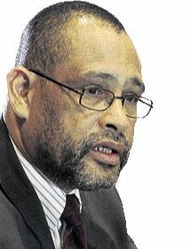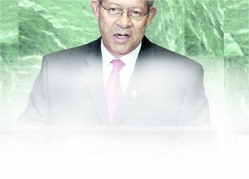'They had to go' - Golding says Lewin did too little to curb crime
Published: Wednesday | November 4, 2009


( L - R ) Latibeaudiere, Lewin
With the appearance that little or nothing was happening to get a grip on the nation's crime rate, Prime Minister Bruce Golding says his administration lost confidence in Police Commissioner Rear Admiral Hardley Lewin's ability to lead the Jamaica Constabulary Force (JCF).
Addressing Parliament yesterday, however, Golding declared Lewin was not pushed out of the job and that the Government was never hostile to him.
Golding told members of the House of Representatives that Cabinet had last month informed the police com-missioner, who handed in his resignation last week, that it needed results.
The prime minister said Lewin was called to a meeting on October 26, at which "the Cabinet expressed its deep anxiety to see greater effort at tackling the problem and improved results in reducing crime".
Golding said Lewin's two-paragraph resignation letter, which he submitted to the Police Service Commission (PSC), was dated October 20.
Deeply concerned
The prime minister said Cabinet expressed to PSC chairman, Professor Gordon Shirley, on October 12, that it was "deeply concerned about the escalating level of crime, did not feel that the strategies being pursued were effectively addressing the problem, and that it had lost confidence in the ability of the commissioner to deliver the results the country required".
As of October 30, 1,361 murders were recorded by the police. Golding said that, while Lewin had a crime-reduction strategy which he did not question, he believed more needed to be done.
"We have sought, within the limits of the resources available, to provide every possible support to him and the force, especially in their efforts to combat the high level of crime and violence that is plaguing the country," Golding said.
He told Parliament that "no commissioner of police can be blamed for the crime that is plaguing us".
However, the prime minister noted that "it is the job of the commissioner to mobilise the police force and all the resources at his command to bring the level of crime to tolerable limits".
"...if we are not careful, if we don't get serious, start executing executing better, if we don't start getting out there - there are long-term strategies that have to be followed, there are more resources that have to be made available," Golding stressed. "But the inadequacy or resources and the time it is going to take you for transformation cannot be an excuse that you give people and say 'the murder rate has to get worse before it gets better'. The public of Jamaica is not interested in that sort of projection. They want actions and they are not satisfied that we are doing everything possible to get this crime rate under control. My own view is that not everything that is possible was being done, not everything that could be done was being done."
Golding said the police commissioner could not lead the fight against crime alone.
"He needs the support of the Government and the entire society but, ultimately, the responsibility to lead and organise the police force is his, and he, like the minister (of national security), me and everyone who leads, must be held accountable," Golding said.
Two weeks ago, Lewin told journalists during a press conference that the tools of policing were finite. He also said that a critical aspect of fighting crime was to break down organised crime and the links between crime and politics.
Lewin said "steady hands and calm nerves" were needed to deal with the crime problem.
daraine.luton@gleanerjm.com.










